I would like here to iterate on this previous question. But now I have a relationship among 3 tables. I believe it's useful here to look at an entity relationship diagram to better understand the structure of the underlying database.
The schemas.py relates this picture into code, where Host has a one to many relationship with Binary which in turn has a many to one relationship with Map_Products_All.
from typing import Optional
from sqlmodel import SQLModel,Field,Relationship
# Binary Data Model
class BinaryBase(SQLModel):
software_install_path: Optional[str] = None
class Binary(BinaryBase,table=True):
id: Optional[int] = Field(default=None,primary_key=True)
host_id: int = Field(foreign_key="host.id",nullable=False)
host: "Host" = Relationship(back_populates="binaries")
product_id: int = Field(foreign_key="map_products_all.id",nullable=False)
product: "Map_Products_All" = Relationship(back_populates="bins")
# HOST Data model
class HostBase(SQLModel):
name: str
region: Optional[str] = None
os_version: Optional[str] = None
network: Optional[int] = None
class Host(HostBase,table=True):
id: Optional[int] = Field(default=None,primary_key=True)
binaries: list[Binary] = Relationship(back_populates='host')
class HostReadWithBinary(HostBase):
binaries: list[BinaryBase] = []
class BinaryReadWithHost(BinaryBase):
host: HostBase
# Mapping Data Model
class MapBase(SQLModel):
eim_product_id: Optional[int] = None
vendor: Optional[str] = None
name: Optional[str] = None
eim_name: Optional[str] = None
manufacturer: Optional[str] = None
class Map_Products_All(MapBase,table=True):
id: Optional[int] = Field(default=None,primary_key=True)
bins: list[Binary] = Relationship(back_populates="product")
lev: Optional[int] = None
The main.py router function call is this one:
from schemas import HostBase,Host,BinaryBase,Binary,HostReadWithBinary,BinaryReadWithHost,MapBase,Map_Products_All,EimBase,Eim,EimMap,RemediationInput,Remediation
from fastapi import FastAPI,Depends,HTTPException
from sqlmodel import SQLModel,Session,select,col
def get_session():
with Session(engine) as session:
try:
yield session
finally:
session.close()
app = FastAPI()
@app.on_event("startup")
def on_startup():
SQLModel.metadata.create_all(engine)
@app.get(
"/binaries/",
response_model=list[HostReadWithBinary]
)
def get_binary(name: Optional[str] = None,session: Session = Depends(get_session)) -> list[Host]:
query = select(Host).limit(100)
if name:
query = query.where(col(Host.name).contains(name.lower()))
return session.exec(query).all()
The above code works and I get a response as such:
[
{
"name": "hkg3pl0479",
"region": "HK",
"os_version": "Red Hat 6.10",
"network": 3,
"binaries": [
{
"software_install_path": "/opt/appd/machineagent",
"product_id": 21
}
]
},
...
However since this response has a product_id, and the Binary table is linked through the Map_Products_All table via this attribute and relationship model:
product_id: int = Field(foreign_key="map_products_all.id",nullable=False)
product: "Map_Products_All" = Relationship(back_populates="bins")
I would like to get the information from MapBase into the response model above. I am bit confused on how to achieve that since it involves connecting 3 tables.
